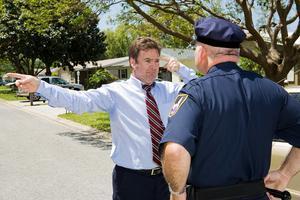Can the Results of Field Sobriety Tests Be Challenged After an Illinois DUI Arrest?
 If someone asked you right now, could you stand on just one foot for 30 seconds while holding your other foot just off the floor? What about walking heel-to-toe along a straight line, then turning and coming back on the same line? What if the line was imaginary, and you could not see it? Did you know that if you had trouble with either of these exercises, federal agencies indicate that there is about an 80 percent chance that you are currently intoxicated?
If someone asked you right now, could you stand on just one foot for 30 seconds while holding your other foot just off the floor? What about walking heel-to-toe along a straight line, then turning and coming back on the same line? What if the line was imaginary, and you could not see it? Did you know that if you had trouble with either of these exercises, federal agencies indicate that there is about an 80 percent chance that you are currently intoxicated?
Clearly, this was meant to be an exaggeration, but the reality is that the tests mentioned in the previous paragraph are actually part of the battery of tests that the police use every day to test drivers who are suspected of being impaired by alcohol or drugs. The results are commonly used as evidence for the prosecution in DUI cases, even though the tests are not quite as accurate as the police and prosecutors want you to believe they are.
What You Should Know About FSTs
The National Highway Transportation Safety Administration (NHTSA) recognizes three tests as being effective in establishing a driver’s impairment level. Together, these three tests are known as the Standardized Field Sobriety Tests, or SFSTs. The horizontal gaze nystagmus test, or HGN, is used in addition to the walk-and-turn and the one-leg stand tests. The HGN test requires the driver to follow a pen or a finger using only his or her eyes. (The officer is watching for involuntary eye movements, particularly at the periphery, that are used as indicators of impairment.) The tests are usually administered together, and courts across the country generally accept the results as evidence of the driver’s intoxication. Such evidence, however, can and sometimes should be challenged.
Concerns Regarding Accuracy
In its training materials, the NHTSA acknowledges that the Standardized Field Sobriety Tests have not undergone large-scale validation studies in over 20 years. The last such study was done in 1998, and during that study, the SFSTs were estimated to result in “correct arrest decisions” in about 90 percent of cases in which all three tests were used. This means that under the NHTSA’s own interpretation of a best-case situation, a bad arrest decision is made in about 1 in 10 cases. Maybe these test results are not as foolproof as prosecutors and police seem to think.
Accuracy issues can arise from a variety of circumstances—some on the part of the test subject and others on the part of the administrating officer. For example, if the driver has inner-ear issues that affect balance, the results of the one-leg stand and the walk-and-turn are likely to be compromised. Likewise, if the officer does not follow the standardized procedure for administering the tests, the entire set of results could be thrown out as evidence.
Speak With a Chicago DUI Defense Lawyer
If you are facing drunk driving charges based on the results of field sobriety testing, a Chicago DUI defense attorney can help. Call 773-276-5541 for a free consultation with a member of the team at Luisi Legal Group today. We will work hard to ensure that your rights and best interests are fully protected.
Sources:
http://isp.state.il.us/docs/5-299.pdf
https://www.nhtsa.gov/sites/nhtsa.gov/files/documents/sfst_full_instructor_manual_2018.pdf







